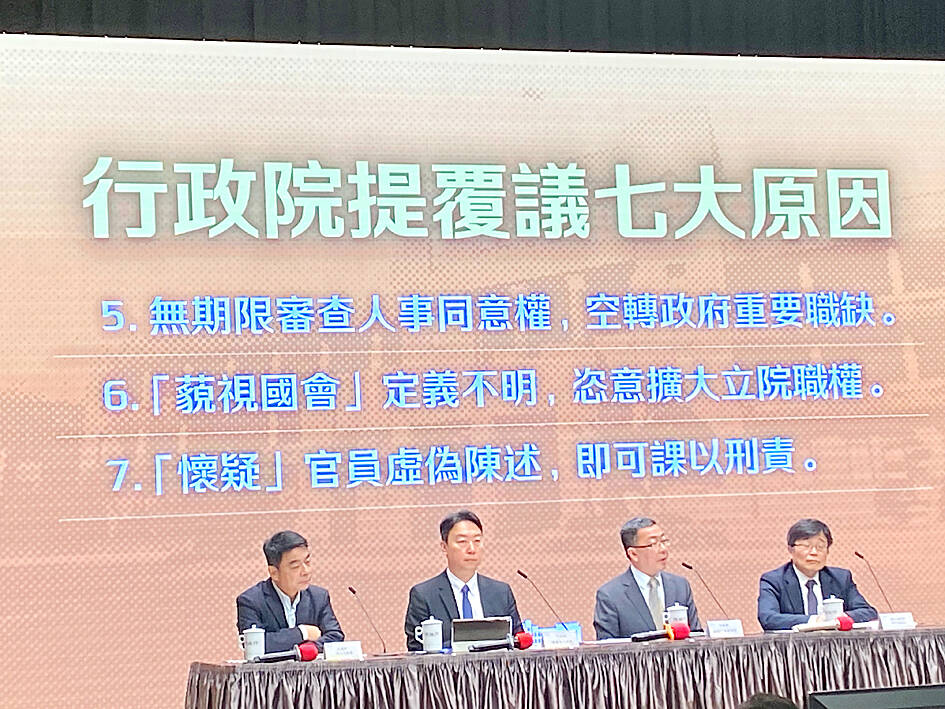The Executive Yuan yesterday decided to send controversial legislative reform bills back to lawmakers for reconsideration, pending approval from the president, saying they are unconstitutional and would be difficult to implement.
The Cabinet found the measures passed on Tuesday last week by Chinese Nationalist Party (KMT) and Taiwan People’s Party (TPP) lawmakers “difficult to implement,” Minister Without Portfolio Lin Ming-hsin (林明昕) told a news conference yesterday.
The Cabinet was preparing, pending the president’s approval, to request that lawmakers reconsider those revisions in accordance with Article 3-2 of the Additional Articles of the Constitution, he said.

Photo: Chung Li-hua, Taipei Times
Lin was referring to the measures that would give the legislature new investigative powers, the ability to hold hearings, and impose fines on public officials who refuse to attend a hearing or provide information, or lie.
Those measures contradicted past constitutional interpretations, which say the exercise of investigative and hearing powers must be restrained, Lin said.
Furthermore, the measures stipulate that public officials who fail to comply would be guilty of “contempt of the legislature” and subject to imprisonment, but does not clearly define what constitutes contempt, Lin said, adding that the punishments contravened constitutional principles of proportionality.
Lin said the amendments requiring the president to give an annual state of the nation address to the legislature and then take questions from the floor are unconstitutional, and are not in line with Taiwan’s system.
The deliberation that led up to the passage of the measures “lacked substantive discussions” and therefore “violated democratic principles,” Lin said.
Lin said the amendments to the Act Governing the Legislative Yuan’s Power (立法院職權行使法) and the Criminal Code were also approved through “unconstitutional procedures,” so those revisions, regardless of their justifiability, were unconstitutional.
The amendments seeking greater oversight of the president’s and Cabinet’s powers have caused brawls in the legislature and sparked heated debate in society over the past few weeks.
Although the Democratic Progressive Party (DPP) has vehemently opposed the revisions, it advocated for increased oversight of the executive branch while in opposition. However, it has sidelined the issue since coming to power in 2016.
The KMT and TPP maintain that the revisions have followed due process and are a necessary reform, in light of previous allegations of corruption in the government’s major policies and investment projects.
The Constitution states that if the Executive Yuan finds a bill passed by the Legislative Yuan difficult to execute, it can, with the president’s approval, request for the legislature’s reconsideration within 10 days of receiving the bill.
President William Lai (賴清德) would make a decision after a careful assessment, Presidential Office spokesperson Kuo Ya-hui (郭雅慧) said.
Within 15 days of receiving the Cabinet’s request, the legislature must vote on whether to uphold the passage of the bill. If it fails to reach a resolution within this period, the bill would become invalid.
The Cabinet’s decision was not meant to escalate conflict between the parties, Cabinet spokesperson Chen Shi-kai (陳世凱) cited Premier Cho Jung-tai (卓榮泰) as saying.
They hope that the legislature would re-examine the amendments and ensure they are aligned with the Constitution and national interests, Cabinet spokesperson Chen said.
Asked whether the Cabinet would take the case to the Constitutional Court, Lin only said it was “too early” to consider such a “hypothetical” question.
DPP lawmakers can also request a ruling from the Constitutional Court on the revisions’ constitutionality.

The manufacture of the remaining 28 M1A2T Abrams tanks Taiwan purchased from the US has recently been completed, and they are expected to be delivered within the next one to two months, a source said yesterday. The Ministry of National Defense is arranging cargo ships to transport the tanks to Taiwan as soon as possible, said the source, who is familiar with the matter. The estimated arrival time ranges from late this month to early next month, the source said. The 28 Abrams tanks make up the third and final batch of a total of 108 tanks, valued at about NT$40.5 billion

Two Taiwanese prosecutors were questioned by Chinese security personnel at their hotel during a trip to China’s Henan Province this month, the Mainland Affairs Council (MAC) said yesterday. The officers had personal information on the prosecutors, including “when they were assigned to their posts, their work locations and job titles,” MAC Deputy Minister and spokesman Liang Wen-chieh (梁文傑) said. On top of asking about their agencies and positions, the officers also questioned the prosecutors about the Cross-Strait Joint Crime-Fighting and Judicial Mutual Assistance Agreement, a pact that serves as the framework for Taiwan-China cooperation on combating crime and providing judicial assistance, Liang

A group from the Taiwanese Designers in Australia association yesterday represented Taiwan at the Midsumma Pride March in Melbourne. The march, held in the St. Kilda suburb, is the city’s largest LGBTQIA+ parade and the flagship event of the annual Midsumma Festival. It attracted more than 45,000 spectators who supported the 400 groups and 10,000 marchers that participated this year, the association said. Taiwanese Designers said they organized a team to march for Taiwan this year, joining politicians, government agencies, professionals and community organizations in showing support for LGBTQIA+ people and diverse communities. As the first country in Asia to legalize same-sex

MOTIVES QUESTIONED The PLA considers Xi’s policies toward Taiwan to be driven by personal considerations rather than military assessment, the Epoch Times reports Chinese President Xi Jinping’s (習近平) latest purge of the Chinese People’s Liberation Army (PLA) leadership might have been prompted by the military’s opposition to plans of invading Taiwan, the Epoch Times said. The Chinese military opposes waging war against Taiwan by a large consensus, putting it at odds with Xi’s vision, the Falun Gong-affiliated daily said in a report on Thursday, citing anonymous sources with insight into the PLA’s inner workings. The opposition is not the opinion of a few generals, but a widely shared view among the PLA cadre, the Epoch Times cited them as saying. “Chinese forces know full well that